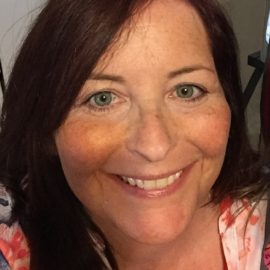How my story begins: In July of 2001, after several months of having an abnormal discharge between menstrual cycles, I scheduled an appointment with my general practitioner for a check up. Upon arrival and discussion with my doctor, little did I realize that I hadn't had a Pap test in 8 years, a year following the birth of my third daughter. During my exam, my doctor said "this doesn't look good, I am going to refer you to a gynecologist." The next week, I had my first appointment with my new OB/GYN, who did both a Pap test and a colposcopy. After the results came back showing abnormal cells, I was scheduled for a cone biopsy. On September 7, 2001 I had an appointment with my doctor to go over the results of the biopsy and was told that I had stage 2a cervical cancer.
How I felt after diagnosis: The only way that I can describe how I felt at hearing this news was shock and numb. I remember leaving my doctor's office and just driving around town with no direction or thought of where I was going or what I was doing. My sister-in-law watched my daughters for me, so I called and asked her if she could keep them a little longer that day and just that "something came up and I couldn't come and get them."
Telling my family and friends: My children at the time of my diagnosis were 12, 11 and 9. The only thing that they knew about cancer was that their grandmother (my mom) passed away from it 8 months before my oldest daughter was born. At that age, there isn't a distinction between types of cancer and outcomes in their mind. My worst fear was telling them of my diagnosis and ensuring that they understood the best they could, the difference in cancer type, staging and treatment. I told the rest of my family through phone calls, but no one that we knew of ever had this cancer. In 2001, the internet was still new and used for email, chat rooms and news. There weren't any social media outlets or wide ranging browsers like Google or MSN, and it was all through a dial-up connection. So if someone called your house, you got kicked off the internet!
My treatment: Since the desire to have any additional children was behind me, a radical hysterectomy would be scheduled as soon as the surgeon from Indianapolis had an opening. Even though Fort Wayne is the second largest city in Indiana, we did not have any specialized in this area. So two weeks later, on September 21, 2001, I had a radical hysterectomy with 27 lymph nodes removed. Because of my age, my ovaries were left in place so that I would not enter menopause. My 4 inch incision was from hip to hip. Chemo and radiation were not needed as pathology from the surgery showed clear margins and no detection in the lymph nodes.
How I felt after treatment: After treatment, I felt like my body was failing me. I started to have bladder and colon problems and saw many doctors and had many tests but no concrete solutions. Once I was able to resume a regular lifestyle, I wanted to jump back into a normal routine with the girls, while in my head having the fear of another occurrence.
What was most difficult for me: After learning more about the cancer that I had at that time, there was in my mind a perception that people would look at me unfavorably. The risk factors for cervical cancer were smoking, sex at a younger age, multiple births, and a virus that was passed on through sexual intercourse (HPV). Since the HPV test wasn't available at the time, the cause of my cancer was unclear and I was afraid of what people would think of me.
Where I am today: I consider my surgery date as my official cancer-free date and I remain there today. Just in the past couple of years, I have become comfortable talking about my cancer and becoming more of an advocate for women to ensure that screening tests are conducted and that those eligible are aware of and getting vaccinated.
What I want other women to know: I want other women to comprehend that we know our bodies best. If something seems wrong or is off, though you may be scared or unsure, it is better to get checked and have nothing serious wrong than to not be checked and have something wrong. I have learned that all cases are unique in their own way and do not take anything for granted. I know ladies that have been staged at a lesser or same stage who are no longer with us, and I also know those living after a stage 4 diagnosis.
How I will try to help others: My hope is to provide support and guidance to women who may just be starting to detect signs of some underlying issue, going through treatment or even considered cancer free, and help them feel comfortable in sharing their stories to help eradicate this disease. Our best hope is to get all eligible girls, boys, women and men vaccinated to stop this cycle of HPV carriers.
